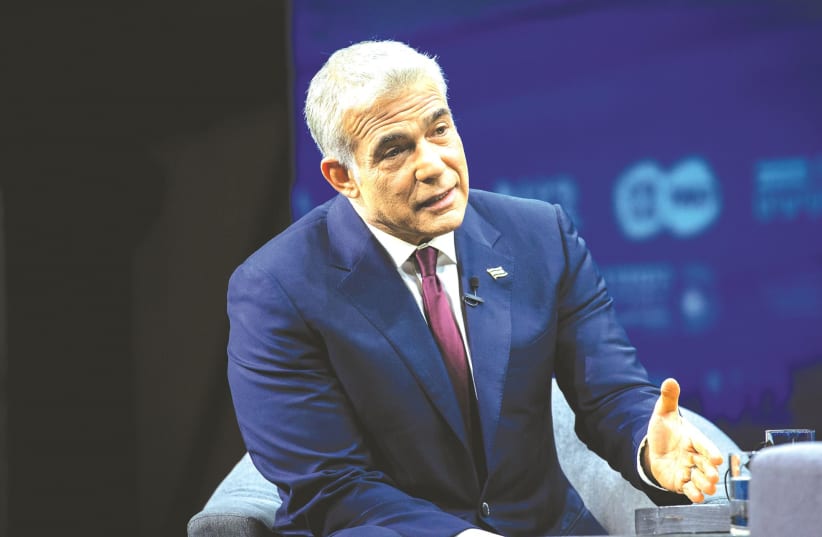The danger posed by Iran may be one of the few things where the four men who could be the country’s next prime minister have similar views.
Yet, what they would actually do as prime minister, how the US would act toward them and how the Islamic Republic itself would view Israel, could vary significantly.
Prime Minister Benjamin Netanyahu is the most known quantity in this arena.
He will act aggressively against the Islamic Republic on the diplomatic, military, covert operations and cyber front.
Netanyahu will openly press the Biden administration not to follow through on its commitment to rejoin the 2015 nuclear deal.
Most crucially, he will publicly criticize the Biden administration’s idea of an improved deal, even if it contains new components such as limiting Tehran’s ballistic missile program and some extensions of nuclear limits.
In turn, the Biden administration will need to choose whether to face Netanyahu’s public wrath along with those in the US who think similarly, or whether to ignore the criticism and act based on its viewpoint of American interests.
Iran’s Supreme leader Ayatollah Ali Khamenei has shown he is both intimidated by Netanyahu as well as ready to challenge Israel at sea, with cyberattacks and via proxies in Lebanon, Syria, Iraq and Gaza.
THE PARTY leaders of New Hope (Gideon Sa’ar), Yamina (Naftali Bennett) and Yesh Atid (Yair Lapid), each of whom might be prime minister after the election and might share running the country with one of the others, appear at first not so different.
All three are on record as viewing Iran as a major threat – and most of the time they have supported Netanyahu’s policies in combating Iran in a broad sense.
But Sa’ar has previously told The Jerusalem Post that he would reduce criticism of the US in public and that he believes the Biden administration might listen to him more carefully because there is no baggage.
The Biden administration might prefer to avoid publicly banging heads with Netanyahu.
However, it also recently showed it was ready to drop bi-partisan negotiations with moderate republican senators over the coronavirus stimulus bill once it decided that the sides’ positions were too far away from each other on the desired outcome.
Might Sa’ar be able to get the US to demand some additional concessions from Iran in exchange for keeping a low profile regarding the deal whereas such an understanding may be out of the question for Netanyahu?
The same might be true about Lapid.
Where he has criticized Netanyahu about foreign policy, the focus has been on the prime minister’s public fighting with the US.
Like Sa’ar and unlike Netanyahu, Lapid views the US as the big brother who has a right to certain levels of Israeli deference.
In this way, either Sa’ar or Lapid might be a throwback to the days when Israeli leaders bent over backwards not to fight in public with the US, and if there was public daylight it usually only came from the American side.
It is also possible that Lapid might get the US to demand more from Iran by agreeing to offering concessions to the Palestinians – something which Netanyahu has refused, and Saar, at least initially, would likely try to avoid.
BENNETT WOULD be an entirely different game.
He is viewed as more radical by Democrats and the Biden administration and might get lower levels of cooperation than Netanyahu.
On the flipside, Bennett may be even more familiar with US culture than Sa’ar and Lapid, both of whom are generally worldly, and he might pull off some surprises with the US using that knowledge.
There is also the transformation that sometimes occurs in the prime minister’s chair.
Ariel Sharon was famously ready to fight with and anger the US until he became prime minister, when suddenly, maintaining US support became more primary than any given specific ideological issue.
The same could happen to Bennett or any of the others.
It is likely that Iran would test any of the three challengers more than it has recently tested Netanyahu.
No one, probably not even the candidates, knows how they would respond to such a test.
Though conventional wisdom might expect them to hesitate to respond too strongly, wanting to avoid a conflict, former prime minister Ehud Olmert showed that sometimes new prime ministers react with the highest levels of use of force in order to preempt accusations of weakness.
SA'AR HIMSELF has hinted to the Post that he would take bigger risks with the IDF in a longer and larger conflict in Gaza to clear out Hamas or set it back more than has occurred to date.
He said he would do this even at the cost of more IDF lives in order to secure Israel’s future.
Might he be ready to take the same risks with Iran?
Publicly, Bennett has been the most ready to use force.
He is one of the few on record who at times has expressed a readiness to reoccupy Gaza.
This might also suggest a greater readiness for military risk with Tehran.
But once he was actually defense minister, his tactics were only mildly different than his predecessors.
He has said that Netanyahu restrained him, but his record does lead to doubts about exactly how far he would go to use force if the buck really stopped with him.
The picture of what these candidates would do is far from clear.
But if with Netanyahu, more of the current situation, a new Iran nuclear deal with only limited Israeli input and a certain level of intimidating Iran could be expected.
With the other three candidates, there could be more of a chance to influence the US, but the threat of being tested by Iran would likely increase as well as the chances of the entire picture changing.
